The Other Auld Alliance
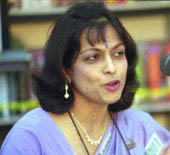 The title of Bashabi Fraser’s poetry collection, Tartan and Turban, humorously sums up one of the central themes of her life as a writer, editor and academic – diaspora. She talks vividly of a childhood in a household full of conversation and ideas, an upbringing steeped in the Bengali Arts, from classical dance to the works of the great Rabindranath Tagore, whose spirit still presides over the vibrant literary life of her home city, Kolkata.
The title of Bashabi Fraser’s poetry collection, Tartan and Turban, humorously sums up one of the central themes of her life as a writer, editor and academic – diaspora. She talks vividly of a childhood in a household full of conversation and ideas, an upbringing steeped in the Bengali Arts, from classical dance to the works of the great Rabindranath Tagore, whose spirit still presides over the vibrant literary life of her home city, Kolkata.
Kolkata enjoys a tradition of challenging intellectual conversation called adda, which enlivens café life, particularly around the universities and in the bookselling quarter. In Kolkata you might walk through commercial districts dominated by a single product – plywood, for example – and ask yourself how hundreds of shops selling it can possibly find a market, even here, in the largest metropolitan sprawl on the planet. But when it comes to the hundreds of bookshops around College Street, there is no question as to demand not meeting supply. 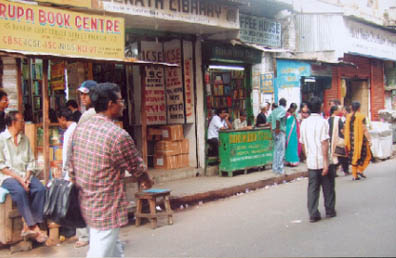 As you wander through the interlacing networks of book booths, mostly with a distinct speciality such as science, politics or literature, there is a constant buzz of customers. The primary denominations of currency are knowledge, ideas and dreams in this culture which vigorously and unabashedly nurtures learning.
As you wander through the interlacing networks of book booths, mostly with a distinct speciality such as science, politics or literature, there is a constant buzz of customers. The primary denominations of currency are knowledge, ideas and dreams in this culture which vigorously and unabashedly nurtures learning.
In February I was there for the Book Fair but missed it by ten days. It had to be relocated in the suburbs, because of a legal challenge to its taking place on its traditional site, the Maidan, the green space which is regarded as the lungs of the city. Kolkata’s permanent smog, a noxious combination of fumes from vehicles that should have seen the knackers yard decades ago, not to mention the ubiquitous put-puts, suggests that the environmental equivalent of emphysema is setting in. 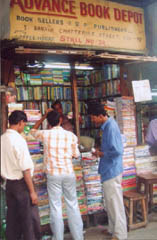 While the Book Fair on the new site suffered a significant decline in ‘footfall’ from an astonishing 3,00,000 visitors, attendance was still massive and most people seemed to agree on the justice of the court ruling.
While the Book Fair on the new site suffered a significant decline in ‘footfall’ from an astonishing 3,00,000 visitors, attendance was still massive and most people seemed to agree on the justice of the court ruling.
In the hiatus before the Book Fair could commence, the Oxford Bookshop was the venue for the Kolkata launch of Kiran Desai’s Booker Prize-winning Inheritance of Loss. At the front of the audience a tangle of journalists thrust fluffy microphones dangerously close to the author, who conducted herself with grace in the face of this throbbing mosh pit. The questions from the audience weren’t at all anodyne, kicking off with a challenge on the subject of language, to which she had to respond that, having spent most of her life in the US, she didn’t read any of the myriad Indian languages (there are over 400). Politely, and with humility, she abstracted herself from the vehemence of language politics.
The experience of diaspora touches Indian society at every level. But for many who seek discovery and connection in other cultures, there is a growing sense that return will be an essential part of the journey, and that India is poised on the verge of some great further flowering, not just economically. 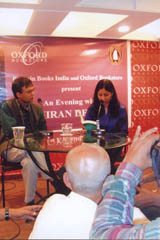
But the boundaries of the India we speak of today are of course not those of the India of sixty years ago, when the British declared Partition, creating the countries which are now Pakistan and Bangladesh, and territorial disputes rumble on. Desai focuses on this in Inheritance of Loss, which is set in Darjeeling, high in the Himalayan foothills, north-east of Kolkata. She saw in its history, architecture, politics and ethnic mix the potential to evoke issues of colonialism, dislocation and diaspora.
Bashabi Fraser attended boarding school in Darjeeling, and also spent a significant part of her girlhood in London, where both of her parents worked as academics. These very different cultural influences are not at war with each other in her work: they are integral both to her academic and artistic endeavours and a pattern of shuttling between West and East continues. Given this background, it seems natural that the complex subject of diaspora exerts such a fascination for her. She regards as one of her most important projects a book of Bengal Partition Stories, featuring ‘oral histories, interviews and fictional accounts’ of the turmoil that ensued when Partition was imposed in August 1947. Her intention is to bring these events under fresh scrutiny, from other than ‘official’ perspectives, not least through personal retellings. She seeks hidden voices and histories that are often obscured.
Kolkata, now setting its cap at becoming, like Edinburgh, a World City of Literature, sent a delegation to Scotland last year and consequently an issue of Edinburgh Review was focused on Bengali writing. An inveterate networker, Fraser has recently been involved in bringing a group of Indian writers to Scotland (which has been made possible through the British Council), and setting up contacts for them with members of Scottish PEN. 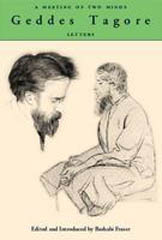 Although she is based mostly in Edinburgh, her journeys between continents are to do with more than personal development and research. They contribute to cross-pollination, for instance in arts projects linking Kolkata and Ballater (where the Scottish visionary planner Patrick Geddes was born). As one of the first books in its new publishing venture, Word Power reprinted A Meeting of Two Minds: Geddes Tagore Letters, reviewed as a ‘luminous exchange of letters between two kindred spirits’ in which editor Bashabi Fraser ‘has revealed a new fascinating side to the age-old relationship between India and Scotland.’
Although she is based mostly in Edinburgh, her journeys between continents are to do with more than personal development and research. They contribute to cross-pollination, for instance in arts projects linking Kolkata and Ballater (where the Scottish visionary planner Patrick Geddes was born). As one of the first books in its new publishing venture, Word Power reprinted A Meeting of Two Minds: Geddes Tagore Letters, reviewed as a ‘luminous exchange of letters between two kindred spirits’ in which editor Bashabi Fraser ‘has revealed a new fascinating side to the age-old relationship between India and Scotland.’

Comments